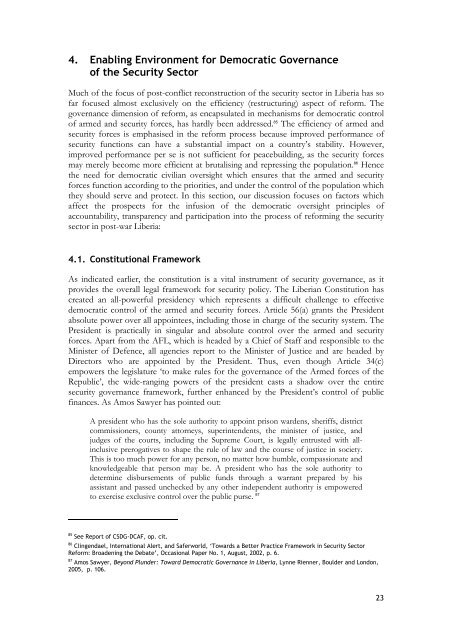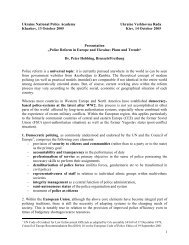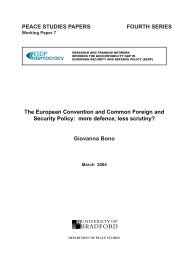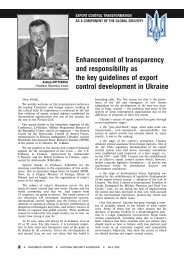The Challenges and Opportunities of Security Sector Reform in Post ...
The Challenges and Opportunities of Security Sector Reform in Post ...
The Challenges and Opportunities of Security Sector Reform in Post ...
You also want an ePaper? Increase the reach of your titles
YUMPU automatically turns print PDFs into web optimized ePapers that Google loves.
4. Enabl<strong>in</strong>g Environment for Democratic Governance<br />
<strong>of</strong> the <strong>Security</strong> <strong>Sector</strong><br />
Much <strong>of</strong> the focus <strong>of</strong> post-conflict reconstruction <strong>of</strong> the security sector <strong>in</strong> Liberia has so<br />
far focused almost exclusively on the efficiency (restructur<strong>in</strong>g) aspect <strong>of</strong> reform. <strong>The</strong><br />
governance dimension <strong>of</strong> reform, as encapsulated <strong>in</strong> mechanisms for democratic control<br />
<strong>of</strong> armed <strong>and</strong> security forces, has hardly been addressed. 85 <strong>The</strong> efficiency <strong>of</strong> armed <strong>and</strong><br />
security forces is emphasised <strong>in</strong> the reform process because improved performance <strong>of</strong><br />
security functions can have a substantial impact on a country’s stability. However,<br />
improved performance per se is not sufficient for peacebuild<strong>in</strong>g, as the security forces<br />
may merely become more efficient at brutalis<strong>in</strong>g <strong>and</strong> repress<strong>in</strong>g the population. 86 Hence<br />
the need for democratic civilian oversight which ensures that the armed <strong>and</strong> security<br />
forces function accord<strong>in</strong>g to the priorities, <strong>and</strong> under the control <strong>of</strong> the population which<br />
they should serve <strong>and</strong> protect. In this section, our discussion focuses on factors which<br />
affect the prospects for the <strong>in</strong>fusion <strong>of</strong> the democratic oversight pr<strong>in</strong>ciples <strong>of</strong><br />
accountability, transparency <strong>and</strong> participation <strong>in</strong>to the process <strong>of</strong> reform<strong>in</strong>g the security<br />
sector <strong>in</strong> post-war Liberia:<br />
4.1. Constitutional Framework<br />
As <strong>in</strong>dicated earlier, the constitution is a vital <strong>in</strong>strument <strong>of</strong> security governance, as it<br />
provides the overall legal framework for security policy. <strong>The</strong> Liberian Constitution has<br />
created an all-powerful presidency which represents a difficult challenge to effective<br />
democratic control <strong>of</strong> the armed <strong>and</strong> security forces. Article 56(a) grants the President<br />
absolute power over all appo<strong>in</strong>tees, <strong>in</strong>clud<strong>in</strong>g those <strong>in</strong> charge <strong>of</strong> the security system. <strong>The</strong><br />
President is practically <strong>in</strong> s<strong>in</strong>gular <strong>and</strong> absolute control over the armed <strong>and</strong> security<br />
forces. Apart from the AFL, which is headed by a Chief <strong>of</strong> Staff <strong>and</strong> responsible to the<br />
M<strong>in</strong>ister <strong>of</strong> Defence, all agencies report to the M<strong>in</strong>ister <strong>of</strong> Justice <strong>and</strong> are headed by<br />
Directors who are appo<strong>in</strong>ted by the President. Thus, even though Article 34(c)<br />
empowers the legislature ‘to make rules for the governance <strong>of</strong> the Armed forces <strong>of</strong> the<br />
Republic’, the wide-rang<strong>in</strong>g powers <strong>of</strong> the president casts a shadow over the entire<br />
security governance framework, further enhanced by the President’s control <strong>of</strong> public<br />
f<strong>in</strong>ances. As Amos Sawyer has po<strong>in</strong>ted out:<br />
A president who has the sole authority to appo<strong>in</strong>t prison wardens, sheriffs, district<br />
commissioners, county attorneys, super<strong>in</strong>tendents, the m<strong>in</strong>ister <strong>of</strong> justice, <strong>and</strong><br />
judges <strong>of</strong> the courts, <strong>in</strong>clud<strong>in</strong>g the Supreme Court, is legally entrusted with all<strong>in</strong>clusive<br />
prerogatives to shape the rule <strong>of</strong> law <strong>and</strong> the course <strong>of</strong> justice <strong>in</strong> society.<br />
This is too much power for any person, no matter how humble, compassionate <strong>and</strong><br />
knowledgeable that person may be. A president who has the sole authority to<br />
determ<strong>in</strong>e disbursements <strong>of</strong> public funds through a warrant prepared by his<br />
assistant <strong>and</strong> passed unchecked by any other <strong>in</strong>dependent authority is empowered<br />
to exercise exclusive control over the public purse. 87<br />
85<br />
See Report <strong>of</strong> CSDG-DCAF, op. cit.<br />
86<br />
Cl<strong>in</strong>gendael, International Alert, <strong>and</strong> Saferworld, ‘Towards a Better Practice Framework <strong>in</strong> <strong>Security</strong> <strong>Sector</strong><br />
<strong>Reform</strong>: Broaden<strong>in</strong>g the Debate’, Occasional Paper No. 1, August, 2002, p. 6.<br />
87<br />
Amos Sawyer, Beyond Plunder: Toward Democratic Governance <strong>in</strong> Liberia, Lynne Rienner, Boulder <strong>and</strong> London,<br />
2005, p. 106.<br />
23

















